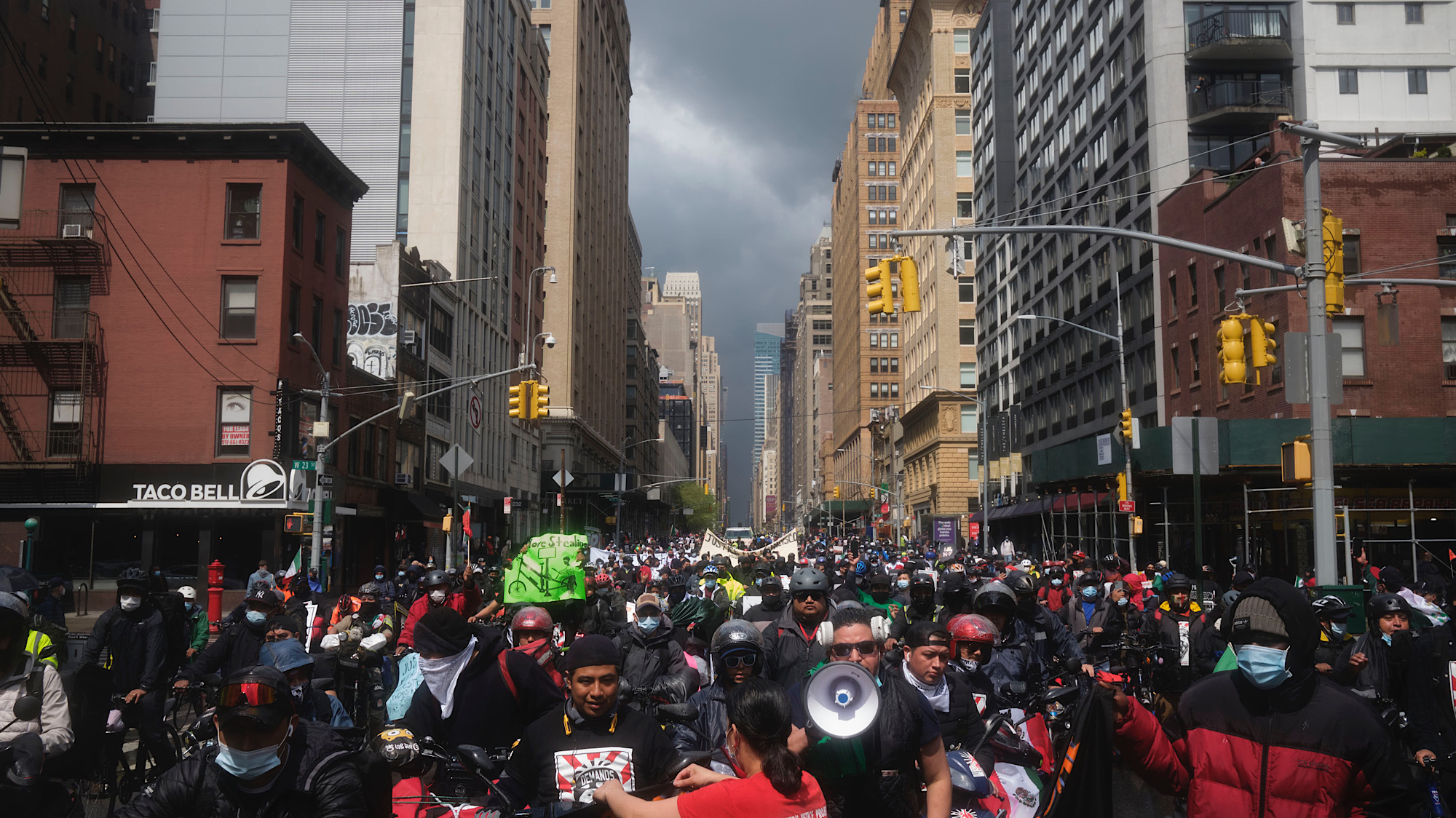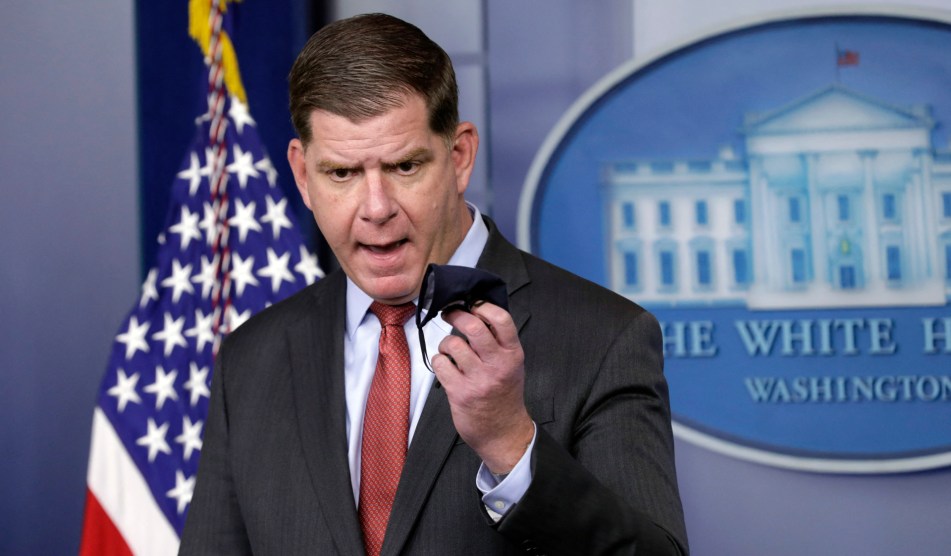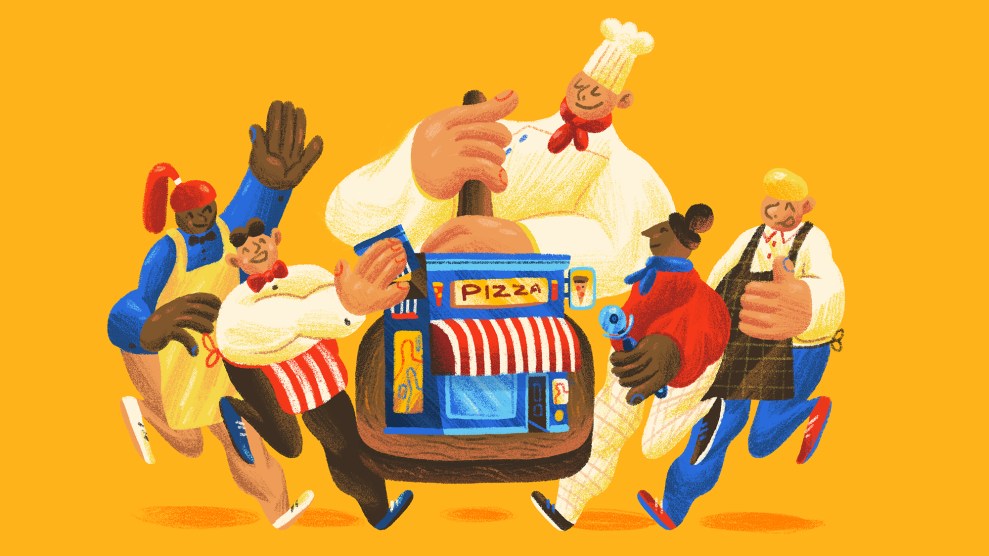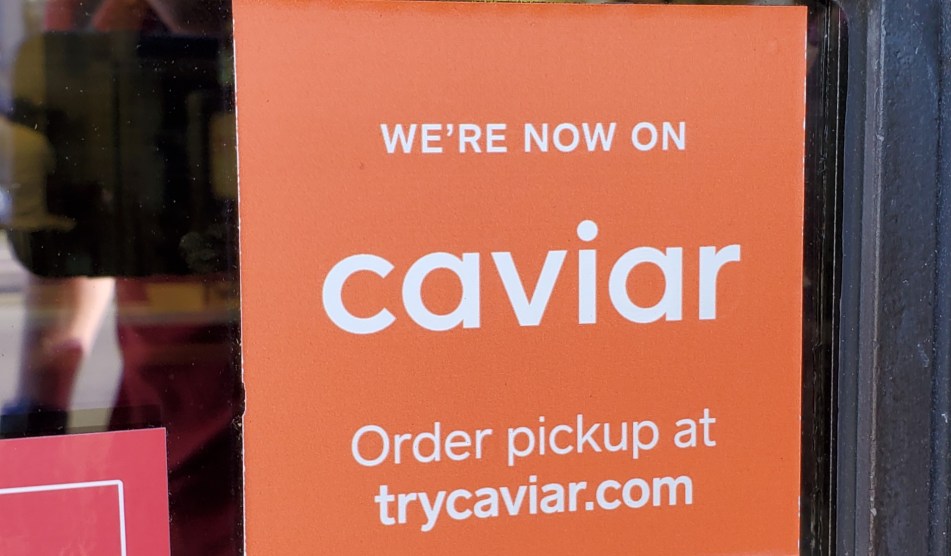On a sunny Saturday in March, Gustavo Ajche and Ligia Guallpa welcomed two dozen food delivery couriers to a morning rally in lower Manhattan. As mimosa drinkers filled SoHo cafes’ outdoor tables, couriers lined up for hot chuchitos, Guatemalan tamales filled with chicken and beef.
Guallpa, head of the immigrant-focused Worker’s Justice Project, and Ajche, a sometime courier himself, had invited the men to learn about Los Deliveristas Unidos, an informal WJP-backed network of mostly Mexican and Guatemalan delivery workers who banded together during the pandemic. Ajche, dousing his snack in green Picamás hot sauce, pitched them on demanding better working conditions: higher wages, a commitment from restaurants to let working couriers use restrooms, and a state-financed insurance fund to replace stolen bikes.
Once everyone grabbed chuchitos, Guallpa, petite and peppy, passed out brochures and stickers with the Los Deliveristas Unidos logo—an illustration of a biker in red, with a helmet, face mask, and raised fist. Several couriers immediately stuck them on their bikes.
Meal delivery apps were a staple of American eating even before the pandemic. Ajche, a native of Guatemala, has been delivering for DoorDash, Relay, and other third-party app-based restaurant delivery companies since 2018, joining a gig workforce tens of millions strong. When he started, they promised wages up to $25 an hour. But over time, Ajche said he realized that “that’s a lie…sometimes you make 5 or 10 dollars an hour”—“in the summer, there are days that you make $50.”
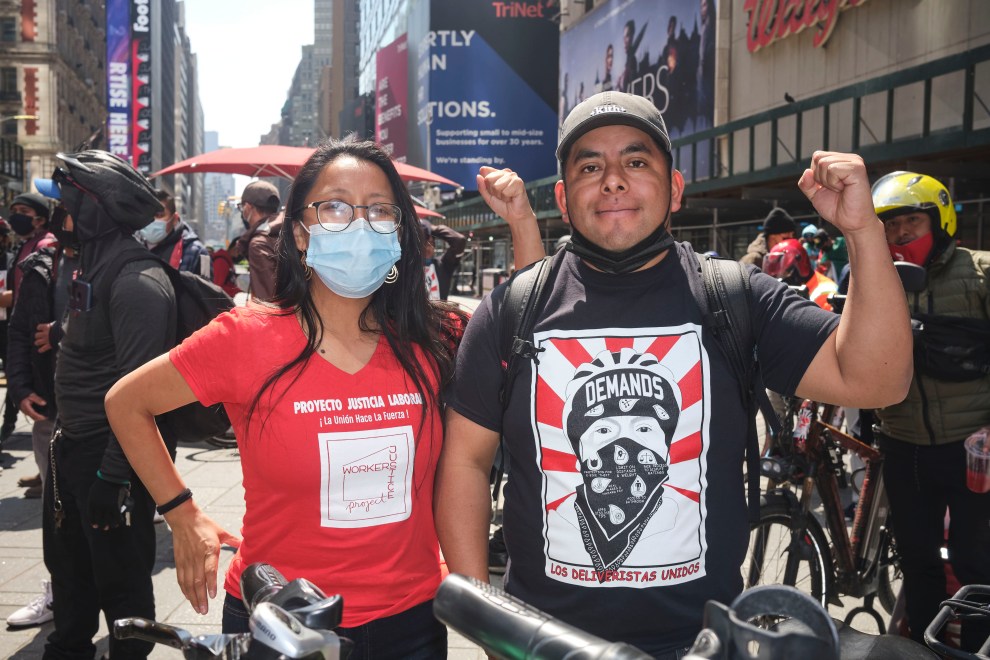
Ligia Guallpa and Gustavo Ajche before a march in Manhattan, New York on Wednesday, April 21, 2021.
John Taggart
Apps don’t always pass along the full amount customers tip to couriers. Between maintaining his black e-bike—which he bought for $2,000, requires batteries that go for up to $600, and costs $75 to $150 a month to park in designated e-bike lots—and the time rushing between distant clients, he usually ends up with slim profits.
Demand for couriers grew during the pandemic, yet their conditions only deteriorated. Lockdowns cut into their hours, leaving many workers struggling to pay bills and feed families. Eighty percent of gig workers surveyed in the summer of 2020 by the University of California, Los Angeles, Labor Center said they weren’t making enough to meet household expenses. A third did not have enough for groceries.
Because most app-based food delivery companies classify workers as independent contractors, not employees, the workers lacked critical labor protections and benefits during an unstable time, even struggling to qualify for SNAP. Benefits applications are ill-suited to gig work, said Joel Berg, the CEO of Hunger Free America. “The social safety net is outdated,” he explained. “It assumes either you’re employed or not.”
The effort to improve gig workers’ access to benefits suffered a major blow in November, when Uber, Lyft, Instacart, Postmates, and DoorDash poured a record-breaking $200 million-plus into a winning California ballot measure exempting the workers from being classified as employees.
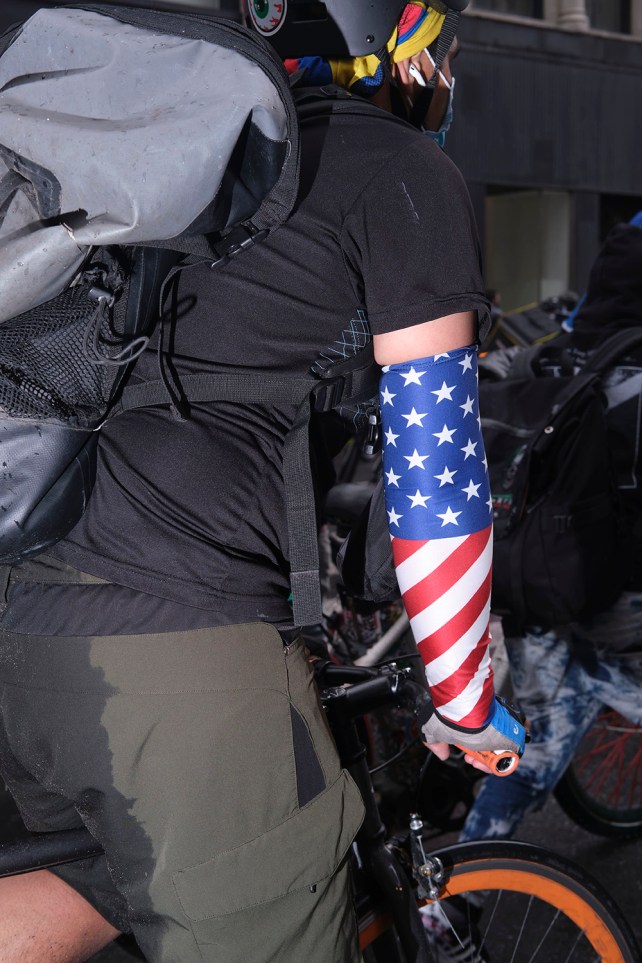
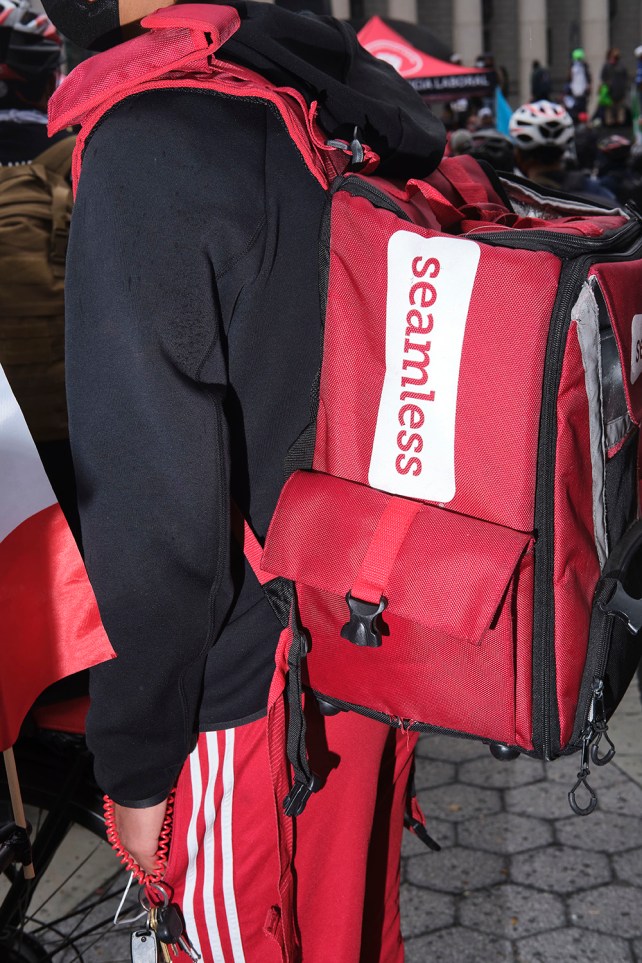
As companies like Uber and DoorDash back similar efforts in other states, Brian Chen, an attorney at the National Employment Law Project, warns that the thinking behind Prop 22 could expand to other sectors: “It sends a message to corporate America that, if you want to reduce your labor costs, if you want to avoid all these annoyances like paying your workers a fair living wage and benefits, then just lobby really hard, spend lots of money on political campaigning, and you got it.”
When COVID shut down New York City last year, the Worker’s Justice Project set up food distribution sites across the city; every Friday, Ajche helps hand out boxes in a lot outside a food pantry in Bensonhurst, where he lives. The pandemic, Guallpa said, has helped more Americans acknowledge the paradox of “essential” gig workers, who, after delivering food across the city, line up for food themselves. It also changed the way gig workers think. “The food pantries have been an amazing way to organize and bring people together,” Guallpa said. “During a moment of crisis, people realize they need to be a part of something.”
In October, WJP organized a protest at City Hall that Guallpa said drew 800 people, mostly couriers, from across all five boroughs. Their demands included sick leave and hazard pay, guaranteed access to receipts to monitor where tips go, and protection from routine bike theft—by requiring the New York Police Department to fast-track and prioritize reports of stolen e-bikes and establishing an insurance fund, financed at the state level in collaboration with gig companies.
Since then, New York City Council members have met with Guallpa and other WJP leaders and pledged action. In mid-April, Councilmember Brad Lander, along with several other progressive candidates for New York City offices, rallied outside City Hall to push for legislation that would grant couriers and ride-hail drivers access to sick leave. Later in April, several councilmembers, who had been meeting with WJP in recent months, introduced legislation that would help ensure workers receive all their customers’ tips, require access to restrooms, and boost wages.
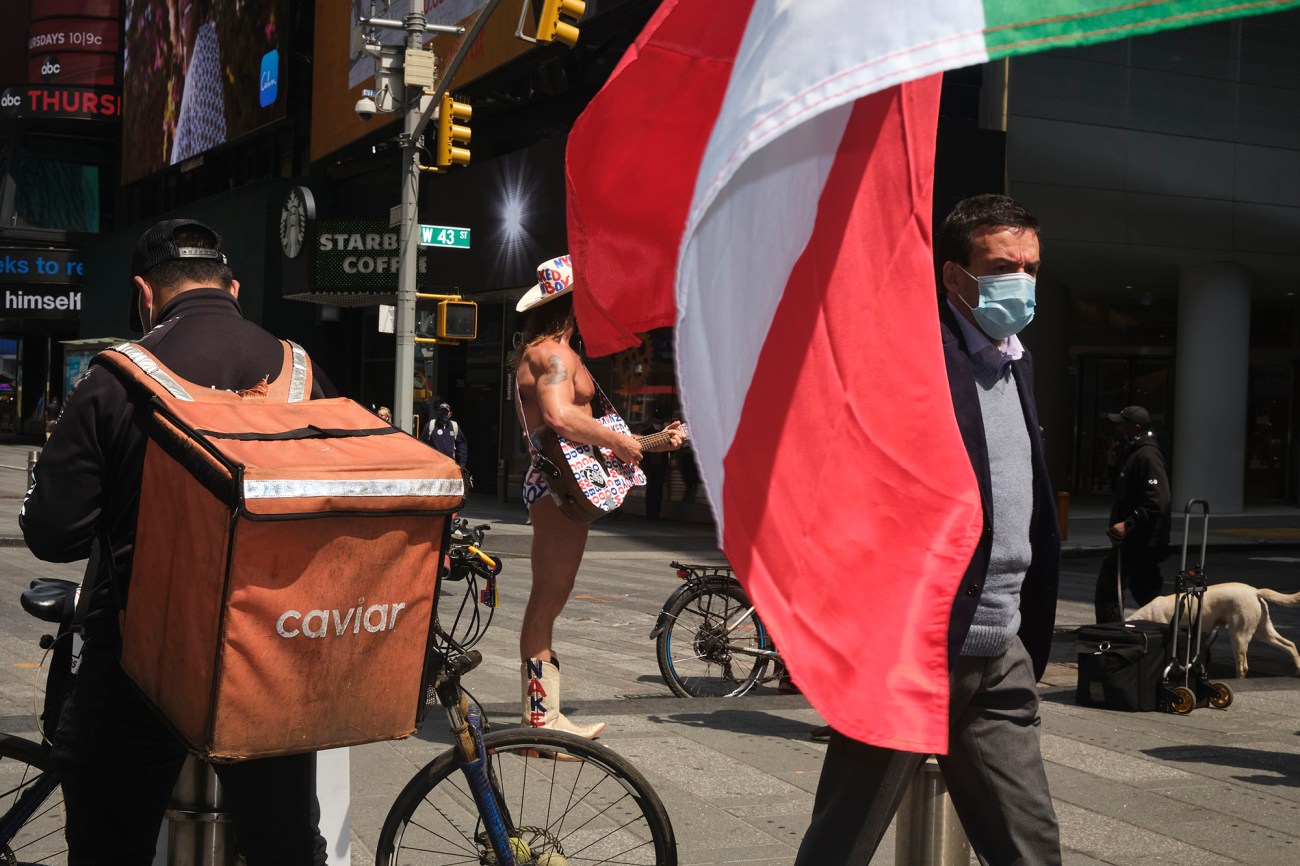
Delivery workers arrive in Times Square before a march in Manhattan.
John Taggart
In February and March, DoorDash met with WJP to discuss tip transparency and wages, but neither Ajche nor Guallpa emerged with much confidence that the company would increase wages or provide benefits.
Ajche described a chilling effect among fellow couriers in light of Prop 22’s success. Even as other workers mount high-profile organizing campaigns around the country—from the January strike at the Bronx’s Hunts Point market, the largest wholesale produce venue in the US, to the April union drive at Amazon’s warehouse in Bessemer, Alabama—he said some workers are worried their activism could be counterproductive. Will it incite powerful companies to double down on unfair practices, rather than compromise?
“We’re just asking for a living wage and better working conditions. If we’re essential, shouldn’t we have what’s essential to survive?” Ajche asked.
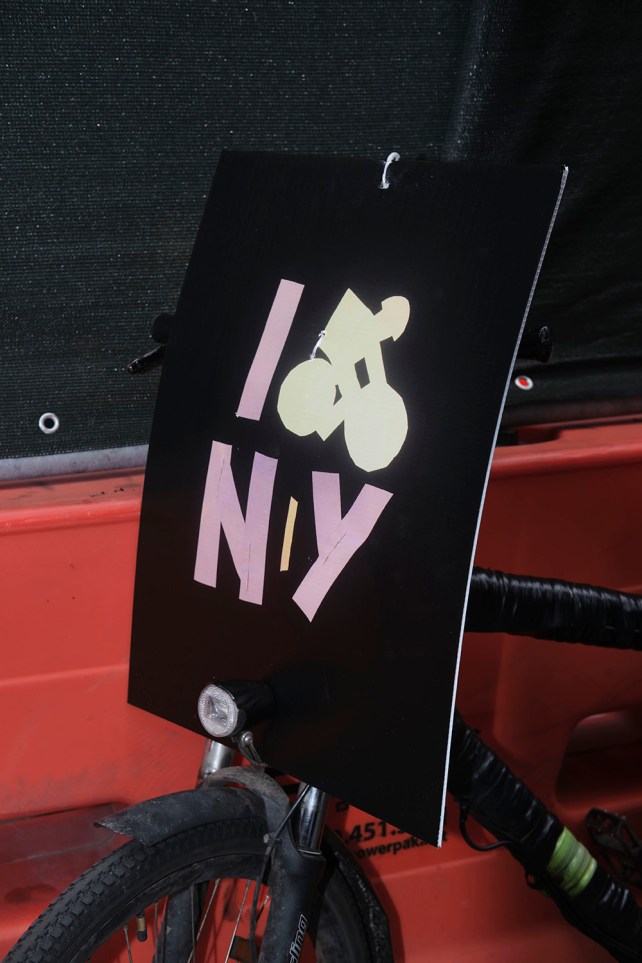
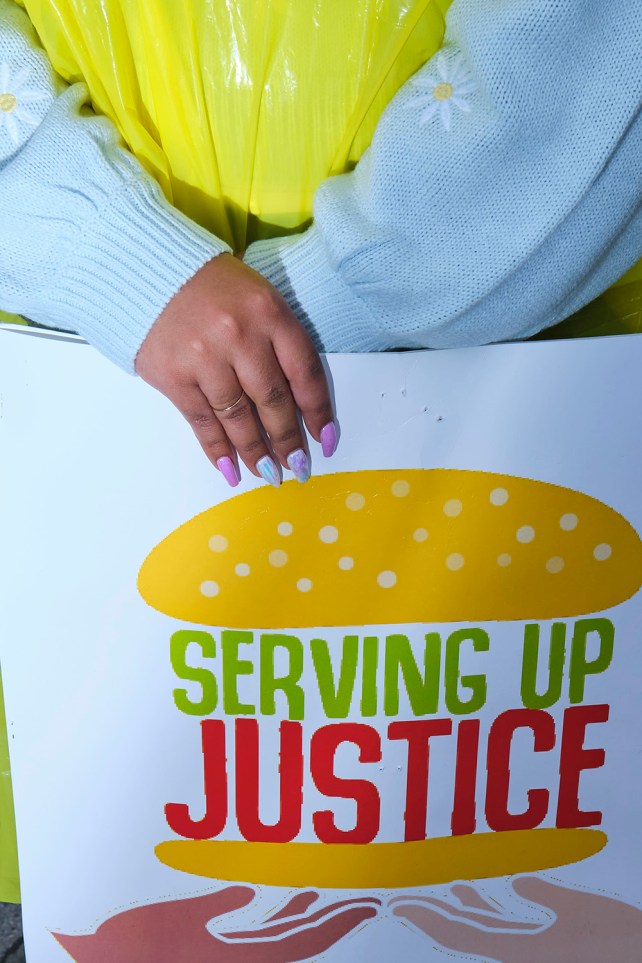
In late March, he and other couriers were left reeling after Francisco Villalva Vitinio, a 29-year-old DoorDash worker, was murdered while on break in an East Harlem park. Four weeks later, WJP and Los Deliveristas organized their largest action yet: 3,000 couriers parading with their bikes from Times Square to City Hall. Under heavy skies and occasional spring rains, protesters in Deliveristas T-shirts held signs mimicking the apps’ branding, swapping “Seamless” for “Shameless” or declaring “Without Us, No One Eats!” Others brandished specific demands: “You aren’t just stealing my bike, you’re stealing my ability to work. Create an insurance fund to replace stolen vehicles.” During the protest, Los Deliveristas announced they were partnering with SEIU Local 32BJ—one of the largest unions based in New York.
As Los Deliveristas rode through the streets, they asserted themselves in a city where they’ve too often been brushed off as a small component of a convenient meal. People leaned out of apartment windows to film, cheer along, or dance to the rally’s marching band. One courier, who preferred to give only his first name, Alejandro, said that in the crowd, for the first time in months, “you feel like people in New York can hear us.”
This story was produced in collaboration with the Food & Environment Reporting Network.
